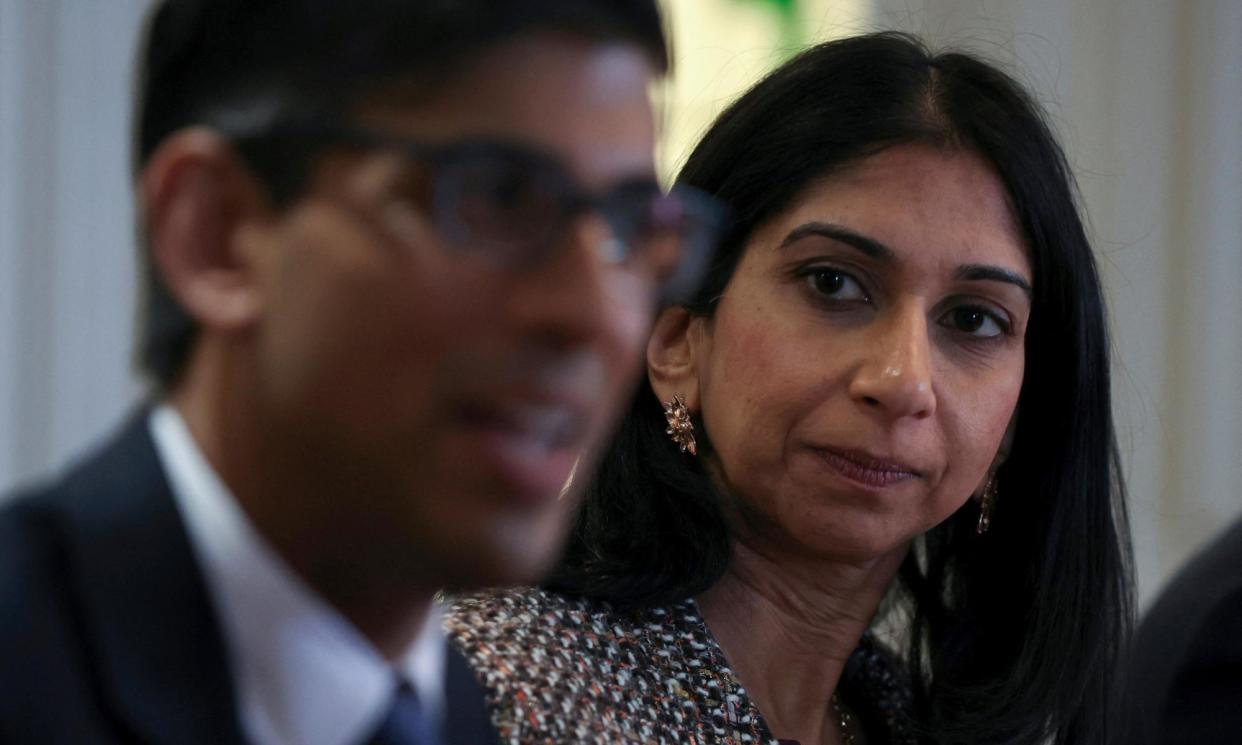Who could replace Rishi Sunak as Tory leader if he loses the election?

What, again? Most likely yes. If the pundits are right, then soon after a seemingly inevitable Conservative election defeat next week the party will be looking for its sixth leader in eight years to replace Rishi Sunak. Who could be in the frame? It depends in part on which MPs survive an electoral wipeout, but here are some likely contenders.
Suella Braverman
The twice former home secretary has been running a de facto leadership campaign ever since Sunak sacked her from the post in November. In her Hampshire seat she has a 26,000 majority, so she should still be around.
A Braverman pitch to the party would be firmly from the right, with a likely emphasis on slashing immigration and withdrawing from the European convention on human rights. She has her fans, but some Tory MPs worry about her judgment and taste for controversy. If she reached the final two and a vote among party members, Braverman may be hard to beat.
Kemi Badenoch
Another near-certain contender from the right, and also with a very safe constituency. Badenoch has the seeming advantage of still being in the cabinet, as business secretary, assuming a link with Sunak is still seen as an asset post-election.
A Badenoch run would most likely be characterised by her habitually punchy language, often over identity politics, which she despises, and her apparent ability to turn the most innocuous exchange into an argument. She has significant support, but some Tories worry about her combativeness.
Priti Patel
Continuing the pattern, if Patel decides to try – and allies suggest she is considering it – hers would be yet another entry from the right with a focus on being tough on migration. She also has a seemingly safe majority.
Patel has not been in government since the end of the Boris Johnson era, under whom she was home secretary. This stint was not without incident – she only just kept her job after an investigation found she had bullied civil servants. Since then Patel has quietly worked away as a backbencher, making some new allies in the process. Perhaps one to watch.
Tom Tugendhat
The security minister would hope to become the vessel for hopes of Tory centrists, something he tried in the 2022 leadership campaign to replace Johnson, coming fifth.
Tugendhat is affable, not short on self-confidence, and even though he is fighting a new seat, he should survive all but a truly awful election for the Tories. His chances hinge primarily on whether a rump parliamentary party sees a bad defeat as a reason to tack towards the centre or move further to the right. He could also struggle to win over Tory members if he reached the final two.
Penny Mordaunt
The sword-carrying, debate-bickering Commons leader is still officially a Tory centrist, although she has tried to broaden her appeal by rolling back on her more liberal views, for example on trans rights. She is recognisable and a tough debater, and could be a formidable opponent.
There are two things that count against her. The first is a perceived tendency to make unforced errors, such as a launch video in the 2022 race that had to be withdrawn and re-edited as it featured people who had not given permission to appear. Then there is a more terminal issue: many polls suggest Mordaunt will lose her Portsmouth North seat to Labour.
James Cleverly
The home secretary has been a regular election presence for the Conservatives on the airwaves and in the spin room, and as foreign and then home secretary has been Sunak’s Mr Loyalty. Cleverly is well known and affable, and can be a good communicator.
While officially a centrist, Cleverly is not averse to a bit of culture warring, and could appeal to some on the right. His most likely downfall – aside from a tendency to occasionally say silly things – is his centrality to the Sunak project. Tory MPs, not to mention members, may be wanting a change.
Robert Jenrick
Viewed by some in the party as a B-list Braverman – he resigned as immigration minister after she was sacked – Jenrick is nonetheless believed to be keen to run and organised.
A previously little-known figure, whose rise up the ministerial ranks under Johnson resulted in him being labelled “Robert Generic”, Jenrick has reinvented himself as a migration and culture war hardliner. He has even treated himself to a serious new haircut.
Grant Shapps
The insider’s insider, the defence secretary is never far from any Tory scheming, and the man who has run spreadsheets tracking support for others in the past is widely believed to be considering a go himself.
Though experienced, as a frontbencher since 2010 Shapps could also suffer the obstacle of being seen as a creature of the party that the voters had just rejected.
Victoria Atkins
Many voters, and even some Tory members, might say: “Who?” While an MP since 2015, Atkins has been a cabinet minister for little more than six months, made health secretary in the most recent Sunak reshuffle.
She is nonetheless seen within the party as a good communicator, and has such a safe seat – her 2019 majority was not far short of 29,000 – she would survive anything beyond an extinction-level defeat.
Nigel Farage
He is not a Conservative member, or even yet an MP, and has said his aim is to destroy the Tories. But could a post-oblivion party welcome the Reform UK leader as its saviour? The answer is probably no, and if it was tried, it may be at the cost of a split, as aghast centrists jumped ship. But (a few) stranger things have happened.


